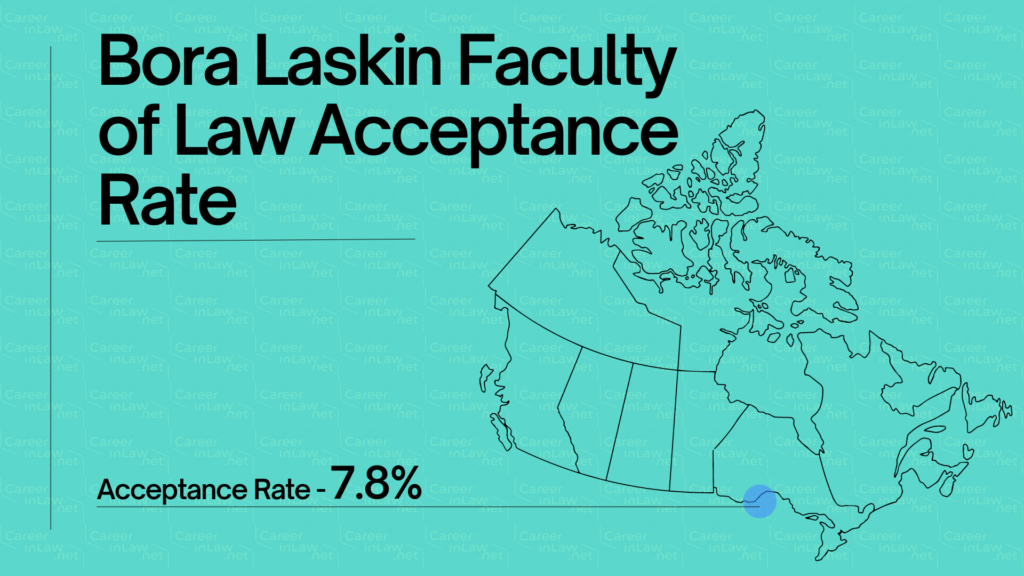Lakehead University is proud to be the home of the Bora Laskin Faculty of Law in Thunder Bay, Ontario. This esteemed institution was established in 2013 and has quickly become a favourite amongst Canadian law students. In this guide, we will discuss the distinctive features, admission criteria, enrollment statistics, financial information, and the curriculum of this JD program.
Check out your alternative option to Study Law in the UK.
Bora Laskin Faculty of Law Acceptance Rate
In 2024, the Bora Laskin Faculty of Law acceptance rate is 7.8%. As the Lakehead Law School is the smallest law school in Ontario and British Columbia, it is rather discrete regarding the exact data regarding the number of submitted yearly applications. However, it has been revealed that 65 students succeed in being admitted annually, adding to the total enrollment of 195 students across the three-year Juris Doctor program. Given that other law schools in Ontario admit roughly 200 first-year students per year from over 2,000 applications, we could presume that Lakehead University receives between 650 and 1,000 submissions.

Lakehead University Law School Requirements
The requirements for Lakehead University Law School are very similar to those of other Canadian schools. You must apply between August and November 1 because late applications will not be accepted. Undergraduate students from all higher studies disciplines may apply during their third year of bachelor studies. Below are the requirements for a law degree at Bora Laskin Law School:
- LSAT Requirements – minimum 152
- GPA Requirements – minimum 78%
- Transcripts – required
- Personal Statement – required
- Letters of Reference – at least 2 letters of reference
- Resume – not required
LSAT Requirements
Several sources have noted that although the minimum LSAT score of 152 is accepted, it is advisable to aim for a score as high as possible, ideally above 165 out of 180. The Law Faculty at Lakehead University is one of the few that do not disclose their LSAT criteria and undergraduate GPA admission results. Despite the lack of transparency, Lakehead Law School may be flexible with its requirements. It accepts the highest score from multiple LSAT sittings, provided they were taken after June 2017.
GPA Requirements
It is estimated that students who achieve a GPA between 75-80% (either a B+ or an A-) in their undergraduate degree have a realistic chance of being accepted into Bora Laskin’s Juris Doctor program.
Find out about the 2-Year Graduate Entry LLB Degrees.
Transcripts
Post-secondary degree transcripts are required, including Letters of Permission and Exchanges.
Personal Statement
An 8,000-character personal statement provides an opportunity for applicants to share their aspirations for enrolling in the law course, work experience, and any mitigating circumstances. Indigenous and black students are encouraged to share how they relate to their communities in this piece of writing.
Letters of Reference
At least two references of an academic character, although a combination of an academic reference with a non-academic one could be accepted.
Resume
No CVs or resumes are required, and interviews are not part of the selection process. However, mature applicants should have at least a decade of work experience.
International Applicants
Non-native English speakers must achieve a Test of English as a Foreign Language (TOEFL) score of 103 or a minimum score of 7 under the International English Language Testing System (IELTS).
Bora Laskin Faculty of Law Tuition Fees
In 2024, the tuition fees for domestic students at Bora Laskin Law School are $55,159 for the entire law degree. International students, on the other hand, pay significantly more at $103,312 for their law degree. A detailed breakdown of the tuition fees is in the table below:
Domestic students | International students (estimated) | |
First year fees | $19,411 | $34,000 |
Second and Third year fees | $17,218 | $34,000 |
Estimated textbooks costs | $1000 | $1000 |
Application fee | $112 | $112 |
OLSAS application fee | $200 | $200 |
Three-year total fees | $55,159 | $103,312 |
Find out how much it costs to become a lawyer in Canada.
Scholarships
Lakehead University operates a budget of $11 million dedicated to financial aid across all of its faculties.
Entry-level candidates who are Canadian citizens or permanent residents automatically become eligible to receive a law scholarship granted that they have:
- Achieved a high-grade point average; and
- Are in the upper percentile of the Bora Laskin Law Faculty’s LSAT applicants.
Bora Laskin Law School Ranking
The Bora Laskin Faculty of Law at Lakehead University ranks among Canada’s top 5 law schools. This notable position is attributed to its innovative Integrated Practice Curriculum, specialized focus areas like Aboriginal and Indigenous Law, and Natural Resources and Environmental Law. The school is recognized for its high-quality faculty, small class sizes, and effective community engagement through legal clinics. Graduates have achieved notable success, enhancing the school’s reputation. This ranking reflects Bora Laskin’s commitment to practical and specialized legal education, positioning it well for future achievements in the legal education field.
The Curriculum at Bora Laskin Law School
Lakehead Law School offers a wide range of courses, allowing students to develop an interest and a specialization in a specific area of law.
First Year
Mandatory courses over this academic year include:
- Foundations of Canadian Law;
- Contract Law;
- Criminal Law;
- Torts;
- Property Law;
- Constitutional Law;
- Legal Research and Writing; and
- Aboriginal Law and Indigenous Law.
The following legal attributes will be developed under the IPC practical side:
- Oral and written submissions;
- Drafting documents;
- Legal analysis and research;
- Negotiation; and
- Fact-finding.
Second Year
Compulsory courses over Year Two of the curriculum include:
- Aboriginal Legal Issues;
- Professional Responsibility;
- Civil Practice;
- Business Organisations;
- Administrative Law; and
- Evidence.
For information on electives, check the next section as optional modules for the penultimate and final years overlap.
Third Year
Unless taken during the previous academic year (apart from the last one, which is strictly done in Year Three), the following courses fall under requisite completion:
- Wills & Estates;
- Family Law;
- Real Estate Law; and
- a four-month non-reimbursed Practice Placement at any Ontario law firm to gain practical exposure to the profession.
The below-listed elective modules can be dispersed and collectively taken over Years Two and Three:
- Clinical Law;
- Alternative Dispute Resolution;
- Advanced Criminal Law;
- Tax Law;
- Resources;
- Public Health Law;
- Labour & Employment Law;
- Land Use Law in the North;
- Bankruptcy;
- Intellectual Property & Indigenous Knowledge;
- Special Topics: Natural Resources;
- Advanced Civil Practice; and
- Directed Research Practice.
Why to Choose Bora Laskin Law School
Bora Laskin Law School, a unique institution within Canada’s legal education landscape, presents a distinctive array of strengths and qualities that set it apart. Here’s a detailed look at why Bora Laskin Law School might be the right choice for prospective law students.
-
Focused Areas of Expertise: Bora Laskin Law School specializes in several key areas:
- Aboriginal and Indigenous Law: Offering in-depth study in this vital and evolving legal field.
- Natural Resources and Environmental Law: A critical area, especially given contemporary global challenges.
- Small Legal Business and Solo Practice Training: Providing continuous coaching and insights into managing small legal firms, a unique feature not commonly found in traditional law curricula.
-
Passionate and Engaging Faculty: The school prides itself on having legal educators who are passionate about teaching and excel in engaging and challenging students. This approach ensures a dynamic and enriching learning environment.
-
Robust Academic Resources: Bora Laskin Law School students enjoy access to an extensive range of resources. This includes a well-stocked library with both physical and digital content, high-quality university accommodation, and state-of-the-art facilities.
-
Innovative Integrated Practice Curriculum (IPC): As one of Canada’s newest law schools, Bora Laskin Law School has revolutionized legal education with its IPC, reminiscent of a solicitor apprenticeship in the UK. This integrated approach combines traditional legal studies with practical skill development and includes a four-month placement in the final year, simplifying the process of obtaining a practice license.
-
Personalized Academic Experience: The law school is known for its smaller class sizes, which facilitates a more personalized and interactive educational experience. This environment allows students to quickly integrate into their cohort and benefit from close, one-on-one interactions with instructors.
-
Commitment to Local Community Engagement: Bora Laskin Law School encourages its graduates to seek opportunities in local firms or law clinics. This emphasis on community engagement benefits professional development and fosters a sense of responsibility and connection to the local legal landscape.
-
Hands-On Legal Clinic Experience: The school operates its own Legal Clinic, offering students practical experience in various legal areas such as minor criminal offences, tenant rights, small claims, employment law, and more. This hands-on approach is invaluable for students, providing real-world experience even before graduation.
Frequently Asked Questions
Below, you will find answers to the most commonly asked questions about this topic:
How many students go to Bora Laskin?
The Bora Laskin Faculty of Law admits approximately 65 students a year, leading to a total enrollment of around 195 students across the three-year Juris Doctor program. This smaller size contributes to a more personalized academic experience and closer student-faculty interactions.
How much does the Bora Laskin Faculty of Law cost?
Domestic students pay $19,411 for the first year and then $17,218 for the second and third years. International students are estimated to be paying around $34,000 per year regardless of the year of study.
What are the mandates of the Bora Laskin Faculty of Law?
The law school is known for its unique Integrated Practice Curriculum (IPC), which blends legal theory with practical skills training. It focuses on three key areas:
- Aboriginal and Indigenous Law: Preparing students with knowledge and skills pertinent to Indigenous legal matters.
- Natural Resources and Environmental Law: A focus on issues related to natural resources and environmental concerns, which is particularly relevant given the school’s location in Northern Ontario.
- Sole/Small Town Practice: Training students for legal practice in smaller communities and rural settings, addressing the specific challenges and opportunities in these environments.


